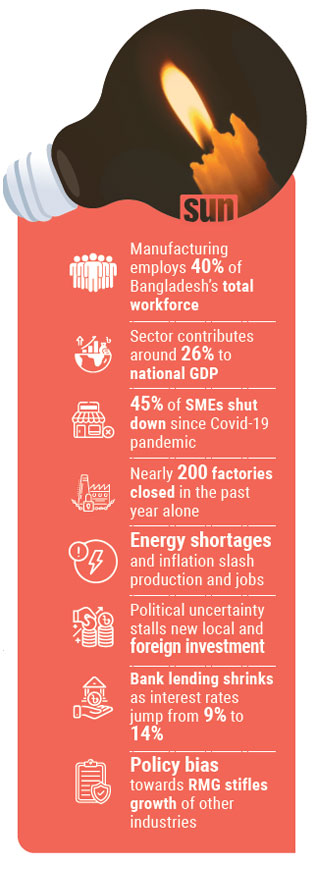
Bangladesh’s manufacturing sector – the country’s largest source of jobs and a key driver of economic growth – is stalling amid crippling energy shortages, policy inconsistencies, soaring interest rates and a widening skills gap.
Industry leaders warn that the slowdown has triggered factory closures, job losses and declining investment, underscoring the urgent need for coherent policy support and a sustainable energy strategy.
PRODUCTION SLUMP AND JOB CUTS
The sector, which employs about 40% of Bangladesh’s total workforce and contributes roughly 26% to GDP, has been hit hard by high inflation, weak domestic demand and declining industrial output.
“Due to high inflation, domestic demand has fallen over the last several years. As a result, production has drastically declined and many factories have shut down. Thousands of workers have lost their jobs,” said Bangladesh Chamber of Industries (BCI) President Anwar-ul Alam Chowdhury Parvez.
He added that the downturn had spilled over into the real estate sector and its related industries – steel, cement and bricks – as Annual Development Programme (ADP) spending sharply decreased following the mass uprising last year.
ENERGY AND INTEREST RATES CHOKE RECOVERY
Anwar-ul Alam, a former BGMEA president, said the industry faces a “multi-pronged crisis” including erratic energy supplies, rising bank interest rates and poor access to finance.
“Around 45% of SMEs have been knocked out since Covid-19. Many took high-interest loans from NGOs and private lenders just to stay afloat. Yet the government has not provided proper support to help them return to business,” he said.
He urged the government to prioritise inflation control, lower lending rates, restore investor confidence, ensure political stability and guarantee uninterrupted energy supply.

FACTORIES SHUT AS ENERGY CRISIS BITES
Business leaders say nearly 200 factories – large and small – have closed over the past year, leaving thousands unemployed as gas and electricity shortages cripple production. Bangladesh Ceramic Manufacturers and Exporters Association (BCMEA) President Moynul Islam, also vice-chairman of Monno Ceramic Industries, said their sector is suffering from dwindling sales and investment.
“High inflation and reduced purchasing power have hit tiles and tableware sales hard. With construction slowing, people are struggling with daily expenses – how can they afford decorative products?” he said.
Islam added that their factories now rely on imported gas. “We have to import gas at high prices due to the shortage of natural gas, which has pushed up production costs massively. Exports have also dropped due to global conflicts and US tariff issues,” he said, expressing hope that stability after the next election could revive the sector.
POLITICAL UNCERTAINTY STALLS NEW INVESTMENT
The Bangladesh Garments Accessories & Packaging Manufacturers & Exporters Association (BGAPMEA) President Mohammad Shahriar said a lack of orders and uncertainty over future demand had slowed operations.
“There is hardly any new investment. Even old investors are hesitant due to political uncertainty. High port and shipping costs have made things worse,” he said, adding that both local and foreign investors are waiting for political stability.
BANKING BOTTLENECKS AND MISSED OPPORTUNITIES
Mohammad Masud Kabir, proprietor of Motex Fashion, said Bangladesh is failing to capitalise on the trade opportunity created by rising tariffs on Chinese and Indian g oods in the US market.
“Our businesses could have benefited, but inadequate infrastructure, logistics, energy shortages, lack of skilled manpower and poor banking support hold us back,” he said.
He added that banks remain reluctant to lend to small firms amid political uncertainty, while high interest rates and frequent power outages discourage investment.
“Delays at ports and bureaucracy further increase costs by 20–30%. Worker productivity remains low – around 50–60% – due to inadequate training. Supply chains must be modernised,” he said.
UNEVEN POLICIES STIFLING NON-RMG INDUSTRIES
Syed Nasir, managing director of Xclusive Can Ltd, said policy inequities favour the ready-made garments (RMG) sector while other industries struggle to grow.
“There is no fair policy for all industries. Different potential sectors cannot flourish because RMG gets privileges others don’t,” he said.
Nasir, who built a LEED-certified factory in Gazipur, said he paid 78% tax on imported fire safety equipment in 2022, while RMG exporters paid only 1%. “We want equal policy support, not financial incentives,” he said.
He also pointed to the sharp increase in lending rates – from 9% to 14% – and the government’s plan to merge five Islamic banks, which has disrupted export-related financial transactions such as letters of credit.
“These issues have collectively hurt industrial growth,” he warned.
A CALL FOR COORDINATED REFORM
Experts and business leaders have called for an integrated government strategy to address policy inconsistencies, strengthen infrastructure, ensure reliable energy supply, and modernise labour skills.
They stress the need to diversify beyond RMG and textiles into higher-value manufacturing, improve domestic value addition, and expand supply chains. “Automation and digitisation of government services could reduce bureaucracy and improve efficiency,” one expert said, urging long-term reforms to make Bangladesh’s manufacturing base more resilient.
_________________________
The reporter can be reached at: [email protected]

